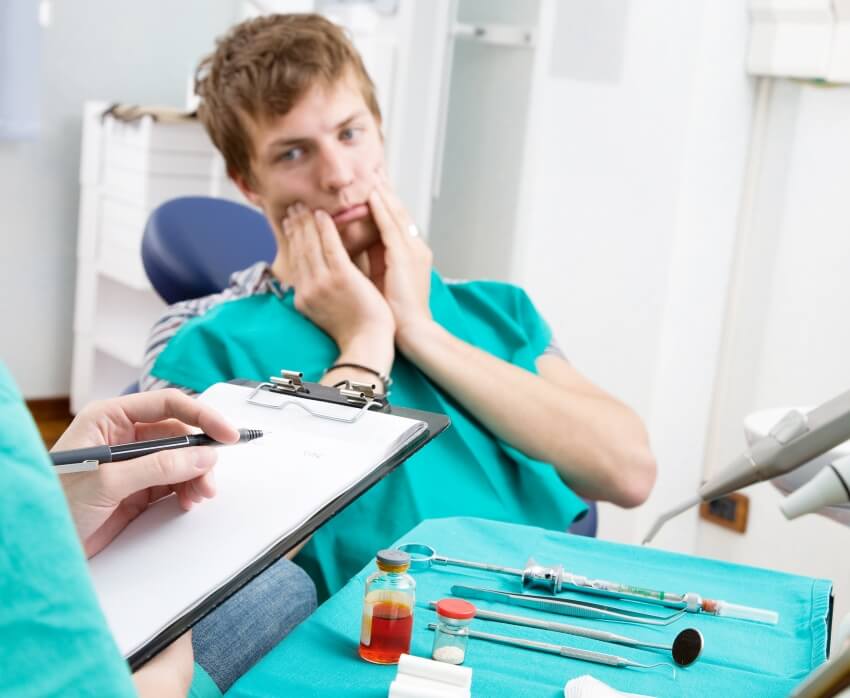Tips to Handle a Dental Emergency
Dental issues can typically wait for office hours for treatment. If you’ve got a minor toothache, for instance, or you’re concerned about your gums, you can generally make it through the night and call your dentist in the morning. In some cases, though, we face true dental emergencies. When something is urgent and can’t wait until it’s convenient to make a dental appointment, what should you do? We’ve got tips to help you handle a dental emergency like a pro.
What constitutes a dental emergency? You may need emergency dental care if you’re experiencing severe dental pain, have lost a tooth, believe you have a gum or dental infection, or have suffered dental trauma, particularly one that has caused loose teeth. A lost dental filling is probably not a dental emergency, but gums that won’t stop bleeding require a trip to an emergency dental clinic. If your face is swollen and you have intense pain, this could be an infection that requires emergency dental services to keep it from spreading throughout your body and becoming dangerous.
In any dental emergency, it’s good to know which measures to take on your own behalf while you’re making arrangements to get to the dentist. We’ve got some advice for you here but want to stress that it’s vital to see the dentist as quickly as possible. Some common situations that require urgent dental care include:
- Knocked-out tooth: Holding the tooth by the crown, rinse the root with water. Be careful not to scrub it, and make sure you don’t remove any tissue fragments that may still be attached. Try to put the tooth back in place if you can, without forcing it into the socket. On the way to the dentist, either hold the tooth in the mouth or put it into a small container of milk. Try to get to the doctor within an hour of the tooth being knocked out for the best chance of saving it.
- Partially dislodged tooth: Get to the dentist quickly, holding a cold compress to the outside of the cheek until you get to the clinic. You can also take an over-the-counter pain reliever if needed.
- Chipped or broken tooth: Save whatever pieces you can, rinsing the mouth and any broken pieces. If your mouth is bleeding, apply a piece of gauze until the bleeding stops. Use a cold compress to relieve pain and prevent swelling.
- Something stuck between the teeth: Try to gently and carefully remove the object with dental floss. Never use a sharp object because this can scratch the tooth or cut your gums.
- Severe tooth pain: Rinse the mouth with warm water and use dental floss to remove any food that’s stuck. If the mouth is swollen, apply a cold compress on the outside of the cheek but never put a painkiller against the gum because it can burn the tissue.
- Abscess: This is an infection that typically begins as a pimple-like swelling on the gum. An abscess is very serious, so get to the dentist immediately if you think this is what’s going on with you. To ease the pain and draw out the infection, try rinsing your mouth with a mild saltwater solution.
- Soft tissue injury: If your tongue, cheeks, gums, or lips are bleeding, rinse your mouth with a mild saltwater solution, apply pressure with a moistened tea bag or piece of gauze for 15 to 20 minutes, or hold a cold compress on the outside of the cheek for five to 10 minutes. See the dentist or get to the emergency room if the bleeding won’t stop.
- Damaged dental appliances: If you lose a filling, stick a piece of sugarless gum into the hole and get to the dentist quickly. If a crown falls off, see your dentist as soon as possible, bringing the crown with you. If you can’t get to the dentist immediately, apply a little bit of clove oil to the affected area with a cotton ball to relieve the pain. Try to slip the crown back over the tooth after coating the inner surface with dental cement, toothpaste, or denture adhesive. Don’t use superglue for this. If a wire from your braces breaks, try to push it back in with the eraser end of a pencil. Don’t cut it because you could end up swallowing it.
- Extreme swelling: If the face is swollen substantially, it’s a good idea to head to the emergency room. It’s of particular concern if the swelling spreads to the eyes, especially if they swell shut, or if the swelling spreads down the neck or underneath the tongue. If it the swelling is painful or makes it difficult to swallow or breathe, seek emergency care immediately.
No matter what you do, it’s very important that you do not panic. Remember, dental emergencies can be frightening but they’re rarely life-threatening. Take a deep breath and assess the situation, using first aid methods and home remedies when applicable as a temporary measure before you can get to the dentist. Calmly but quickly get to an emergency dentist so that you have a better chance of successful treatment.
If your emergency involves your teeth, finding a 24-hour dentist is a better idea than heading to the emergency room. Going to the emergency room often means a lengthy wait, and it’s likely that you’ll be referred to the emergency dentist anyway. The only time it’s preferable to go to the emergency room is in the case of severe dental trauma like a broken jaw, serious lacerations and bleeding, or a head injury.
Whether you need dental care or health care, Brevard Health Alliance, Inc. can help. Brevard County’s only Federally Qualified Health Center, BHA offers extensive health care services on a sliding-fee scale so that we can treat residents regardless of their ability to pay. We’re committed to providing an extraordinary quality of care for our patients in order to improve the health status of Brevard County. Our focus is on continually improving the quality and efficiency of our care, and on ensuring that every patient we serve is heard, encouraged, and respected. As your family health care provider, we strive to provide not just acute care but also preventive care and health care-related education. Our board-certified physicians, advanced practice nurse practitioners, and physician assistance provide primary care that includes well-child checkups, well-woman care, and physicals, along with chronic disease management. In fact, since 2005 we’ve provided not only primary care services, but also behavioral health services, dental services, diagnostic services, resource management services, pharmacy services, women’s health care and obstetrics, Hepatitis C and HIV services, extended hours pediatric walk-in care, and specialty referrals. For more information, to find a location, or to make an appointment, contact us through our website.



















































































































































